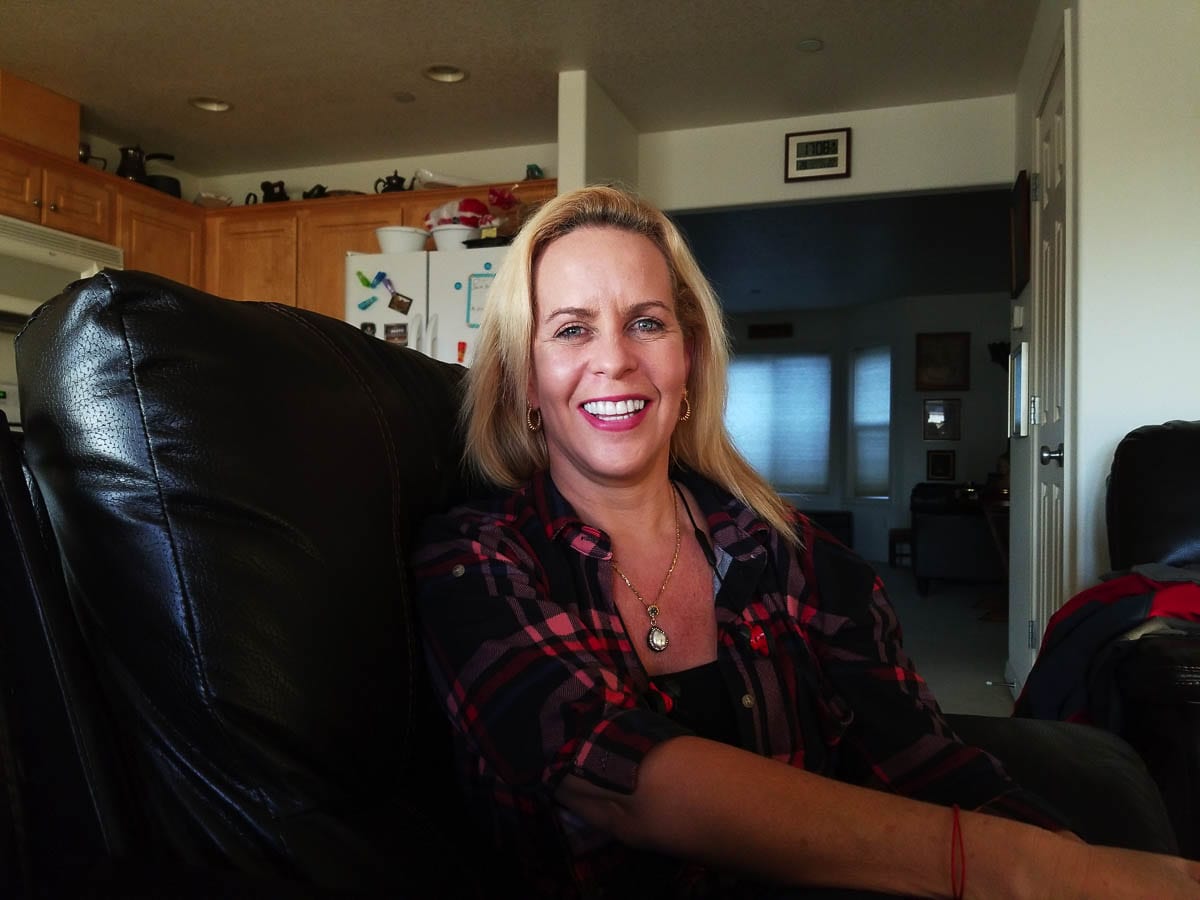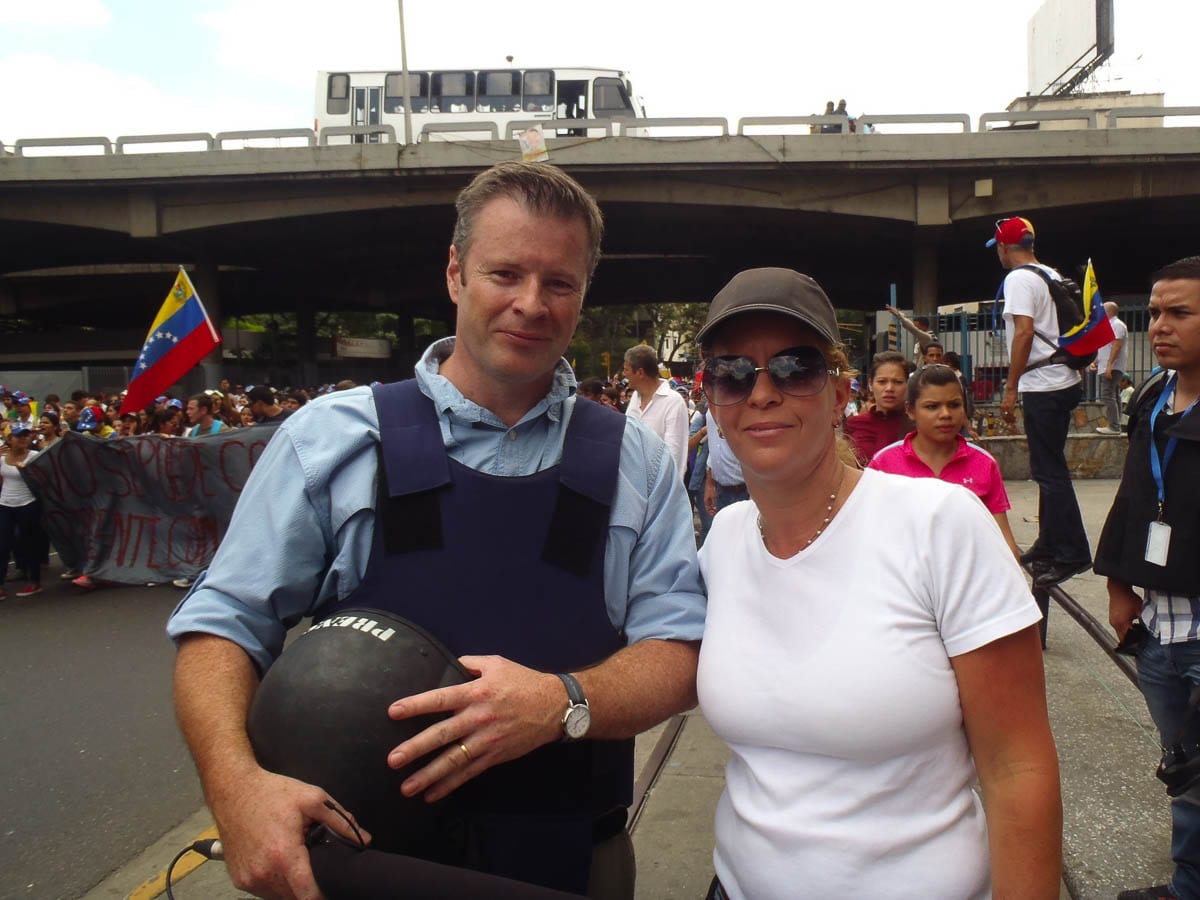Freedom and prosperity are gone under dictatorship, but she fights on
Prosperity, peace, and plenty of opportunity for all.
To hear Henriette Pauchet talk about her years growing up in Venezuela, one would think of it as another American “land of opportunity.” Twenty years later, she had become a freedom protester; she was kidnapped and then freed. Her family fled the country over safety concerns, and she’s temporarily here in Clark County.
Pauchet grew up poor. Her parents divorced when she was very young. Her mother moved the two children to Venezuela to be near family. She began working at age 14, to help her mother make ends meet and to help feed her brother. After high school, she continued on to college and kept working to pay her tuition.
At 18, Pauchet started her first business in tourism, while continuing her university studies. Venezuela’s tropical climate and good economy was a magnet for American, Canadian, and European tourists.

Pauchet is tri-lingual, speaking English, Spanish, and French. Her business thrived and she hired others. She had started with one car, but her success allowed her to buy a van, and then a second van, and then a tour bus. As business got better, she started a second business, planning weddings for foreigners coming to her Margarita Island to get married.
“It was the land of opportunities,” she said. “It’s great to feel that you don’t owe anything to anybody. So you start growing, you start growing in every single way.”
It was a prosperous business. “Just imagine, in the year 2000 I organized 167 weddings in one year,” she said with a smile.
“And then disaster arrived,” she said. “People actually voted for the wrong person.”
In 1998 Hugo Chavez was elected president.. “We didn’t see the decline of the economy until two or three years later.”
Venezuela has the world’s third largest oil reserves, in addition to lots of minerals. Venezuela was one of the five founding members of OPEC. Initially, the oil industry in Venezuela was privately owned. In the 1970’s the oil industry was nationalized. The country had thriving agricultural businesses, including coffee, plantains, bananas, and cacao. Chavez began taking over other successful businesses.
“He used the democratic tools to gain power,” she said. “He was, you could say, very smart. He and his followers portrayed him as a leader and man of the people. Once he arrived in power, things were totally different. The first thing he did was to change the constitution.”
Chavez had come from the military and also had the support of the country’s Congress. The changes granted him more authority, moving the country towards socialism..
Changes were made to the formal name of the country, to the national anthem, and even their “Day of Discovery,” which is Oct. 12. Chavez also took control of the schools. “They started indoctrinating the people and indoctrinating the children in the public schools,” she said. “Twenty years later, the children don’t know what a free and prosperous Venezuela looks like.”
Chavez died in a Cuban hospital in 2013. Weeks before he died, he announced on national television that Nicholas Maduro would take over as his hand-picked successor. Pauchet believes that Fidel Castro actually picked Maduro and Chavez complied.
The decline of Venezuela accelerated under Maduro. In the ensuing years, there not only has been huge protests, but recently between 5 and 6 million people have fled Venezuela seeking a better life and freedom elsewhere.
But Pauchet could not remain silent. She began working with people around the country to push for Democratic reforms and honest, transparent elections. “The last transparent election we had was 1998,” she said. Chavez had rigged the vote-counting system.
Pauchet worked with popular opposition politicians, attending rallies all around Venezuela. At times, there were tens of thousands of people protesting on a daily basis.
What are the people protesting? There have been shortages of food, water, gas, electricity and so many of the basic necessities of life.
“It’s very heartbreaking when you see the difference,” she said. Pauchet grew up in one of the most prosperous countries in South America. Now her children only hear stories of how good “it used to be” from their parents.
“There are many items that you only buy on the black market,” she said. “For many, many months, you wouldn’t see milk. Or if you will see milk, it was a very, very high price. You have to overpay.”
The protests grew, but the government arrested their political opponents and journalists. They also created their own group of armed thugs to intimidate the average citizen. “Many people were killed in the streets,” she said. “Many more people were kidnapped. Many were thrown in jail.”
“You can be driving your car, and suddenly, they block you in between different cars,” she said. “These guys have really long weapons, dressed in black with their faces covered. They just take you out of your car, put you inside their car, and you disappear. You just disappear for days.”
Hand-picked judges enforce the will and intimidation of the regime. “The judge just says you are a leader of a terrorist organization, and you’re going to go to jail for 20 years,” she said.
“It’s a dictatorship,” she said. The judges do what they’re told.
“I was kidnapped in 2017, on the fifth of July, outside the municipal palace in downtown Caracas,’’ Pauchet said. “I was kidnapped by this group of thugs that work for the regime.”
Pauchet was held in an unknown location for at least five hours. She said they threatened to cut her throat. “We’re going to burn you alive,” they told her. “Nobody will know where you are.”
She fought back tears as she described the incident. It was terrorizing.
She was released hours later, without shoes, her jewelry stolen, in a neighborhood near a government building.

Pauchet left the country with her two children a couple days later. “I left the country with my kids, just to calm our nerves,” she said. But six weeks later, she returned to her country and continued to join the protests.
“It was very bad that year, 2017,” she said. There were lots of arrests, and many people killed. “I felt like I survived all the protests. I felt that I was Superwoman. Really, if I am honest, I had a rush of adrenaline. I really felt invincible.”
Two years later it got worse. “Unfortunately, things became really dangerous for my children and also for my husband, because I became a target,” she said. An unknown man spoke to her, telling her the names of her children and husband, where the children attended school and where her husband worked. This was now the second time she was threatened. They had to make a change.
Their daughter is now in college in Europe and her husband Guillermo and son Gabriel moved to Clark County. Their son’s godfather lives in the area. Gabriel, at 16, has a 5-year student visa. His parents are not so lucky.
Pauchet must leave within the next two months as her temporary visa expires. Guillermo got an extension and can remain until next spring.
Henriette plans to visit her daughter, and then return to Venezuela. She wants to fight to return the freedoms and prosperity she knew as a youth, to her county. She wants her children to be able to return someday to a better, freer, more prosperous Venezuela.
“I don’t lose hope or faith at all,” she said. “I still believe in my country, I still believe in the future of my country.”
Pauchet ended her conversation with Clark County Today with passionate advice for Americans. “So what I want to say with all these words, is that never take for granted your freedom. Never,’’ she said. “You have to fight for it. You have to fight for your constitution. Don’t let others decide for yourself.”




